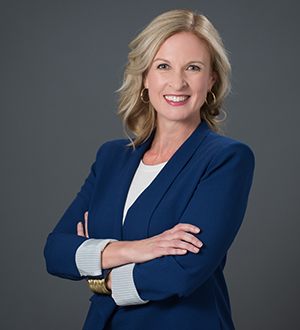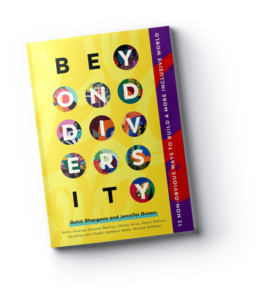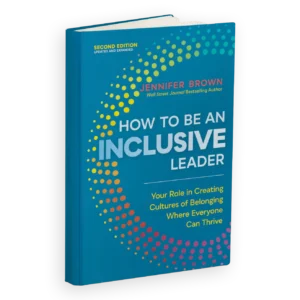Jennifer Brown
Global Authority on Inclusive Leadership and Workplace Transformation
Jennifer Brown (she/her) is an award-winning entrepreneur, speaker, and bestselling author, recognized globally as a leading voice on inclusive leadership and workplace equity. As the Founder of Jennifer Brown Speaks, she equips leaders at all levels to create inclusive cultures where everyone can thrive. Jennifer’s keynotes and advisory work focus on redefining leadership for a rapidly evolving world, helping organizations build workplaces where all individuals feel welcomed, valued, respected, and heard. Jennifer’s thought leadership is informed by her years at the helm of Jennifer Brown Consulting, a certified woman- and LGBTQ+-owned strategic leadership firm that partnered with some of the world’s top organizations. Today, Jennifer continues to inspire and guide leaders toward lasting organizational change through her speaking, writing, and coaching.
Jennifer Brown (she/her) is an award-winning entrepreneur, speaker, author, and globally recognized authority on diversity, equity, and inclusion (DEI). With over 20 years of experience, Jennifer operates through Jennifer Brown Speaks, focusing on keynote speaking and coaching organizations to create inclusive workplace cultures where everyone can thrive. Formerly the founder and CEO of Jennifer Brown Consulting (JBC), Jennifer has shaped the DEI strategies of some of the world’s largest companies and nonprofits. Today, she continues to inspire leaders to embrace inclusive leadership as a driver of meaningful, lasting change.
Jennifer is a bestselling author of four influential books. Her acclaimed works begin with Inclusion: Diversity, The New Workplace, and The Will to Change and culminate in How to Be an Inclusive Leader, which recently released a second edition. This latest version dives deeper into topics of identity, privilege, and equity, equipping readers with actionable steps toward becoming inclusive leaders. She also co-authored Beyond Diversity, a Wall Street Journal bestseller, which explores the intersections of race, identity, and leadership in today’s evolving workplace landscape.
As a sought-after keynote speaker, Jennifer addresses topics including building cultures of belonging, inclusive leadership, impactful allyship, and envisioning the future of work. She regularly speaks for leading global organizations, including Google, LinkedIn, IBM, Toyota, and at major universities and business schools. Jennifer serves on several DEI advisory boards, including L’Oréal, and the Gates Foundation, showcasing her commitment to driving impactful change across industries.
Jennifer hosts The Will to Change podcast, which has nearly 15,000 monthly listeners. The podcast amplifies authentic stories of diversity and resilience, connecting with a wide audience and inspiring leaders to foster inclusive environments. Jennifer’s media presence includes features in The New York Times, Forbes, Harvard Business Review, and Bloomberg Businessweek, highlighting her as one of the leading voices in DEI today. Jennifer lives in New York with her partner of 25 years, Michelle.
ENSURING EQUITY AND BELONGING IN THE FUTURE WORLD OF WORK
The demand for equity is growing louder by the day. To build a more inclusive and equitable future, leaders in positions of power and influence must play an active role in disrupting the status quo and challenging inequitable systems and behaviors.
By having intentionality around creating equitable spaces, places, and corporate cultures, it also forces us to uncover our own prejudices and biases and take a hard look at ourselves and our participation in and perpetuation of inequitable systems. This is uncomfortable work, but chances are, if it’s not uncomfortable, you’re not leading. The greatest opportunity with inclusive leadership is the ability to interrogate ourselves about the role we play in the systems around us and how we can effect positive change in those systems.
When leaders demonstrate intentional and authentic commitment to DEI they instill trust in their organizations and can drive the follower-ship that is needed to create a culture of inclusion where employees of all identities, races and backgrounds thrive and belong.
Takeaways:
- How to identify your power and privilege based on the seats you sit in.
- What you can do to harness that power to help amplify the voices and narratives of those in marginalized communities.
- How should leaders be leading equitably in today’s changing, hybrid and uncertain environment?
- What do equitable inclusion principles look like in practice?
- How do we build cultures where all employees are allies and upstanders for equity and inclusion
INCLUSIVE LEADERSHIP: EVOLVING COURAGEOUSLY, IMPERFECTLY AND FAILING FORWARD
HOW TO BE AN INCLUSIVE LEADER
The time for authentic, inclusive and intentional leadership has never been more urgent. The mindset and skills needed to be an inclusive leader will be top of mind in nearly every organization as we move deeper into the twenty-first century and respond to the emerging challenges we face as organizations and leaders. Becoming an inclusive leader requires learning and reflection, and the willingness to take risks and make mistakes, to do things differently. It means changing broken systems, behaviors, and mindsets – starting with our own.
If we want a more just world, we need to grasp the urgency of our responsibility to get personally involved as leaders because our role is necessary in the change equation.
In this leadership session, Jennifer Brown will discuss the personal traits inclusive leaders must develop and cultivate to authentically lead through periods of change and uncertainty. Jennifer uses the Inclusive Leader ContinuumTM as a framework that can help leaders locate themselves in their learning journey and identify where they need to focus action and attention to progress forward.
Takeaways:
- How do we need to redefine leadership going forward?
- What are the key attributes of being an inclusive leader and how do those attributes vary from the traditional model of leadership?
- How can and should leaders activate to engage in the work of inclusion? What are tangible ways to make progress…even imperfectly?
POWERFUL PARTNERSHIPS FOR CHANGE: HOW INCLUSION AND BELONGING DRIVE HEALTHY WORKPLACES
Employees are demanding a kind of leadership we’ve never seen, with inclusiveness at its core. What this looks like in practice is getting comfortable being uncomfortable, leaning into the discomfort and inviting the new, the unfamiliar, and the challenging so that we can evolve and build healthy workplaces of inclusion and belonging.
People managers, teams and leaders at all levels must engage in the work of inclusion, and identify actions they can take to address unconscious bias, shift mindsets, expand learning, engage in hard conversations, actively seek out and listen to diverse experiences and perspectives, and take a hard look at systems that were not built by or for so many of us.
Jennifer challenges the audience to examine and expand their inner and outer circles by intentionally including new faces and different perspectives, and taking specific steps to become allies and advocates in their organization. What are practical ways to move from awareness of the lived experiences and the microaggressions faced by marginalized identities, to activate and build a stronger community of mutual understanding and support for all colleagues?
Takeaways:
- What are the ingredients of successful allied partnerships in the work of inclusion and how do we start building these?
- What does it look like to hold space for each others’ journeys of understanding as we forge critical 1×1 bonds across difference?
- What does building trust look like?
- What is the role of executive teams in driving cultures of belonging and can we hold each other accountable for progress?
INCLUSION THROUGH CHANGE: WORKING TOGETHER TO BUILD CULTURES OF BELONGING
Building equitable, diverse and inclusive cultures within organizations is a process that requires all of us. Allies, advocates and leaders at all levels must understand how to support inclusion within their organization. Everyone has a stake in this conversation, and a role to play.
Jennifer uses her four-stage Inclusive Leader Continuum as a guide and an effective roadmap to highlight actionable and tangible steps we can all take in our journey as aspiring allies. She will share tips, learnings, and best practices from her vantage point of why the work of building inclusive cultures starts with each of us, and what we can do on a day-to-day basis to lower our waterlines, practice upstander behaviors, and activate around our privileges, to further an inclusive organization.
Takeaways:
- Understand the distinction between allyship as a journey, not a destination, and also between ‘Ask’ versus ‘guess’ culture and why it is critical to get it right as allies.
- Discover some of the most common misconceptions about privilege and how we can use our privilege to help others.
- Find out more about Jennifer’s Rubik’s cube example around identity and intersectionality and how this lays the groundwork for expanded allyship
- Strategies and tips, detailing what individuals can do now to help drive positive change in their organizations
EVERYONE HAS A DIVERSITY STORY: FINDING YOUR VOICE IN THE WORKPLACE
To give their fullest contribution, employees must feel they can bring their full selves to work; however research shows many do not feel comfortable doing so. This means that they are spending valuable energy every day minimizing or managing aspects of their own diversity—of identity, background, experience—in order to succeed.
This takes a particular toll on diverse talent—women, people of color, LGBTQ+ individuals, people with disabilities—at a time when organizations are struggling to recruit, retain, and develop those same individuals. But all of us, and the business, pay the price.
How can we build more inclusive workplace environments where all kinds of talent feel welcome?
When we activate as aspiring allies and inclusive leaders, our commitment deepens, we begin to get more comfortable being uncomfortable, and we stretch ourselves by being more proactive and public with our voice and actions. Finding and activating your authentic voice and telling your story in a way that empowers and generates buy-in, also inspires people around and beneath you and is a powerful way to role model being an authentic inclusive leader and ally.
We need all voices and identities to participate in building a more equitable and inclusive future, and sharing your own diversity story makes it safer for others to do the same.
Takeaways:
- Consider the shifting definitions of diversity, equity, inclusion and belonging in the workplace today
- Revisit the “Iceberg Model” as a conceptual framework to understand where we set our waterline, and what we can do to lower it in the spirit of actionable allyship
- Discover the importance of excavating your own authentic story, how to begin, and why it matters
Identify the roles, responsibilities, and ongoing learning journey for allies, and specific actions you can take next
MORE about The JBC Inclusive Leader Continuum Model:
The future of organizations and the incoming generations call for a kind of leadership we’ve never seen, at least at scale, with inclusiveness at its core.
Jennifer developed the Inclusive Leader Continuum through work with clients over the last 20 years. It provides an effective roadmap to help individuals navigate through their journey to become an inclusive leader. It also provides an important framework for understanding the challenges and mindsets that continue to hold so many leaders back.
Each of the four stages prepares leaders to create relationships that may be new and uncomfortable for them to understand and to consider the employee experience at all levels across all diversity dimensions. The model forms a central tool for a learning journey and gives very concrete specific ways to take action and step into that role as an ally and advocate. The goal of the continuum is to make the learning journey actionable — with new concepts, new vocabulary, and straightforward, easily digestible tools that prepare leaders to take action.




